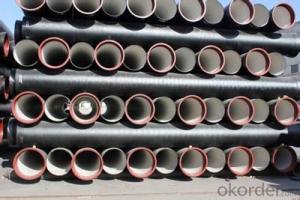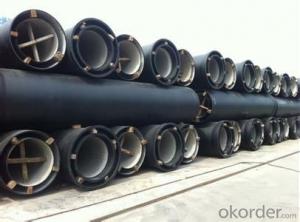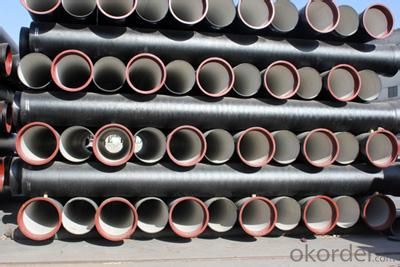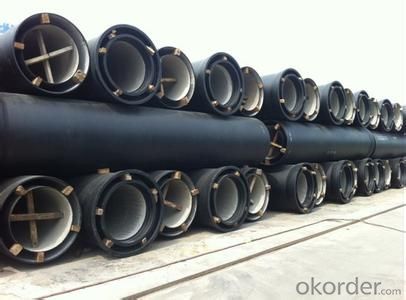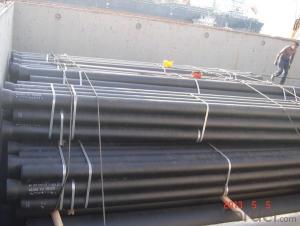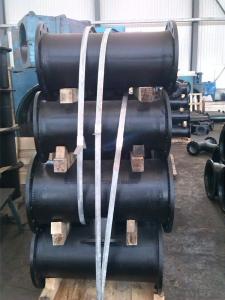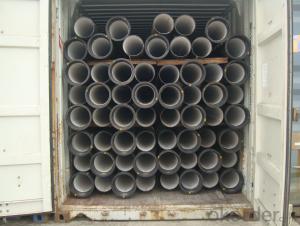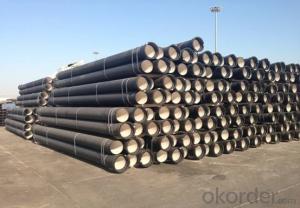DUCTILE IRON PIPE C Class DN80
- Loading Port:
- China Main Port
- Payment Terms:
- TT OR LC
- Min Order Qty:
- -
- Supply Capability:
- -
OKorder Service Pledge
OKorder Financial Service
You Might Also Like
Ductile Iron Cast Pipe is without any defects compare with tradition casting tech, which has many advantages particularly as follow:
(1) High density. In the "vertical upward casting" process, the melt iron of centre liquid column in center crystallizer is continuously feeding for volume shrinkage caused by condensation tube at outer circumference , which lead to be free of shrinkage porosity.
(2) High purity. When melt iron pouring, the mixed impurities such as gas, dross, sand grain which are lighter than melt iron could be eliminated at furnace mouth, its impossible to enter into the crystallizer through the channel, so the melt iron into the crystallizer is very pure.
(3) Strength with toughness. The cooling speed provided by continuous crystallizer is 30 times than sand casting and 5 times than centrifugal casting, and doesn't produce white iron, the eutectic cell volume of continuous cast iron is one eighth to one tenth compare with traditional cast iron. The density of graphite nodule in ductile iron can reach 300-700 pcs/mm2. Therefore, all reason above improve the strength and toughness of continuous cast iron.
(4) Free machining. The high speed cooling make the hardening phase (such as boride, steadite) not appear like reticular, massive or thick, but diffuse like fish bone and pane in shape, moreover, there are tiny graphite flakes inlaid hardening phase. It's free machining in BrinellHardness the range of 250-300HB. However, the Brinell Hardness of 250 is top limit to common metal materials.
(5) Uniform composition of tube wall. The convection mixing of liquid column caused by marching type drawing in crystallizer make the composition of tube wall well-distributed, and concentration gradient very little.
(6) High productivity. To the wall thickness of tube under 10mm, the speed of continuous casting is 1 meter/min, to the wall thickness of tube under 20mm, the speed of continuous casting is 0.5 meter/min, which is high efficiency that centrifugal or other casting tech couldn't reach.
- Q: Ductile cast iron can replace copper sleeve
- Although the ductile cast iron with lubrication, but no lubrication or copper sleeve, Rongchang graphite copper sleeve, with self lubrication with high strength copper alloy (CuZn25Al5, CuZn24Al6Fe3Mn4) as the basic material, according to the use conditions according to a certain proportion in the work surface processing hole and fill in the solid lubricant, high strength copper alloy provide a high bearing capacity and solid lubricant can form low friction.
- Q: How does ductile iron pipe perform in areas with high soil acidity?
- Ductile iron pipe performs well in areas with high soil acidity. Its corrosion-resistant properties and protective coatings make it highly resistant to the corrosive effects of acidic soil.
- Q: Are ductile iron pipes suitable for installation in areas with high groundwater table?
- Yes, ductile iron pipes are suitable for installation in areas with high groundwater table. Ductile iron pipes have excellent corrosion resistance and are highly durable, making them resistant to the corrosive effects of groundwater. Additionally, their strong and flexible nature allows them to withstand external pressure caused by high groundwater levels without compromising their structural integrity.
- Q: Ductile iron pipes perennial bubbles in the water will rot it
- From the hydraulic performance, because ductile pipe specifications generally refers to the inner diameter of PE pipe diameter specifications generally refers to the same specifications, because under the condition of ductile pipe can achieve greater runoff; from the installation and maintenance cost, ductile pipe have more favorable price. The inner wall of zinc spray, anti-corrosion materials such as cement mortar, ductile iron pipe perennial bubbles in the water will not be rotten.
- Q: Are ductile iron pipes suitable for trenchless installation methods?
- Trenchless installation methods can indeed utilize ductile iron pipes effectively. Renowned for their strength, durability, and flexibility, ductile iron pipes prove to be an excellent choice for techniques like horizontal directional drilling (HDD) and pipe bursting. When employing HDD, a small pilot hole is drilled underground, and the ductile iron pipe is subsequently pulled through this hole, eliminating the need for extensive trenching. The robustness of ductile iron pipes allows them to endure the pulling forces exerted during this process while being effortlessly guided along the underground path. Pipe bursting, on the other hand, is another trenchless method that involves breaking apart an existing pipe while simultaneously pulling a new ductile iron pipe into place. Due to their strength and flexibility, ductile iron pipes can withstand the force required to burst the current pipe, resulting in minimal disruption to the surrounding area. Both these trenchless installation methods offer various advantages when ductile iron pipes are used. These pipes possess a high resistance to corrosion and can endure high-pressure applications, making them suitable for a broad range of underground environments. Moreover, their long service life reduces the need for frequent replacement and maintenance. Ultimately, ductile iron pipes emerge as a dependable and appropriate option for trenchless installation methods, presenting efficient and cost-effective solutions for underground pipe installations.
- Q: What are the typical joint sealing requirements for ductile iron pipes?
- When sealing joints in ductile iron pipes, two common methods are typically used: rubber gaskets and mechanical joints. Rubber gaskets are frequently chosen for their reliability and flexibility. They are typically made of synthetic rubber materials that are resistant to water, chemicals, and other environmental factors. On the other hand, mechanical joints are also commonly used for sealing joints in ductile iron pipes. These joints utilize a mechanical device to connect the pipes and create a watertight seal. They are designed to allow for some movement and flexibility, which is particularly important in areas prone to ground movement or settlement. In addition to using rubber gaskets or mechanical joints, it is crucial to properly clean and prepare the pipe surfaces before joining them. This involves removing any dirt, debris, or old joint material from the pipe ends to ensure a secure seal. Following the manufacturer's instructions, the joint should be assembled, ensuring that the gasket or mechanical joint is correctly positioned and tightened to the recommended torque. In summary, the typical requirements for sealing joints in ductile iron pipes involve the use of rubber gaskets or mechanical joints, thorough cleaning and preparation of the pipe ends, and adherence to the manufacturer's assembly instructions. These requirements are essential to achieve a durable and watertight joint that can withstand the pressures and environmental conditions commonly encountered in ductile iron pipe systems.
- Q: Can ductile iron pipes be used for underground utilities?
- Yes, ductile iron pipes can be used for underground utilities. Ductile iron is a strong and durable material that can withstand the pressure and load requirements of underground applications. It is commonly used for water and wastewater systems, gas distribution, and other underground utility infrastructure.
- Q: What are the different methods for cutting ductile iron pipe?
- The cutting of ductile iron pipe can be done in various ways, depending on the project's specific needs and limitations. Some commonly used methods include: 1. Manual Cutting: To cut through the ductile iron pipe, one can employ a handheld saw or grinder equipped with an abrasive cutting wheel. While this method is simple and cost-effective, it can be laborious and time-consuming for larger pipe sizes. 2. Mechanical Cutting: Specialized machinery, such as bandsaws, pipe cutters, or hydraulic cutting machines, can be utilized to mechanically cut through the ductile iron pipe. These machines offer faster and more precise cuts, especially for larger pipe sizes. However, they tend to be more expensive and require skilled operators. 3. Torch Cutting: Also known as oxyfuel cutting, torch cutting involves heating the ductile iron pipe using a torch and then introducing a high-pressure oxygen stream to facilitate a chemical reaction that cuts through the metal. This method is effective for thick-walled ductile iron pipes but necessitates proper safety precautions due to the significant heat and sparks it generates. 4. Plasma Arc Cutting: The utilization of a high-velocity jet of ionized gas (plasma) to melt and cut through the ductile iron pipe characterizes plasma arc cutting. This method is ideal for precision and efficiency when cutting through thick-walled pipes. However, it can be more costly and may require specialized equipment and training. 5. Waterjet Cutting: Waterjet cutting involves using a high-pressure jet of water mixed with an abrasive material to cut through the ductile iron pipe. This method offers high precision and does not generate heat or sparks, making it suitable for sensitive environments. However, it tends to be slower and more expensive compared to other cutting methods. When selecting the appropriate method for cutting ductile iron pipe, factors such as pipe size, project requirements, budget, and safety must be taken into consideration. Consulting professionals or experts in the field can assist in determining the most suitable method for a specific project.
- Q: How can the connection of ductile iron pipe elbow be convenient for connecting?
- The groove connecting pipe consists of two categories of products: sealing function of pipe connections with rigid joint, flexible joint, mechanical three and groove flange; the pipe connections transition of elbow, three links, four links, different diameter pipe, blind plate etc..
- Q: What is the weight of ductile iron pipe compared to other pipe materials?
- Compared to other pipe materials, ductile iron pipe typically carries more weight. The weight of the pipe may differ depending on its size and thickness, yet in general, ductile iron pipe is more compact and has a greater weight per unit length than materials such as PVC, HDPE, or steel. The main reason for this increased weight is the composition of ductile iron pipe, which consists of iron and carbon, rendering it a robust and resilient choice for a range of piping purposes.
Send your message to us
DUCTILE IRON PIPE C Class DN80
- Loading Port:
- China Main Port
- Payment Terms:
- TT OR LC
- Min Order Qty:
- -
- Supply Capability:
- -
OKorder Service Pledge
OKorder Financial Service
Similar products
Hot products
Hot Searches
Related keywords
